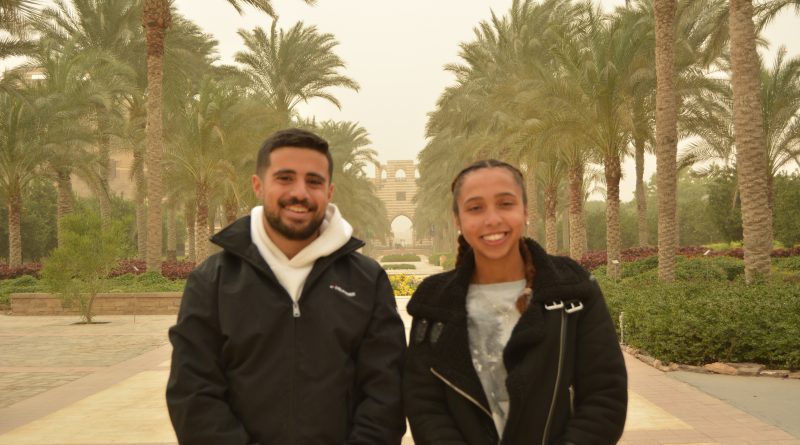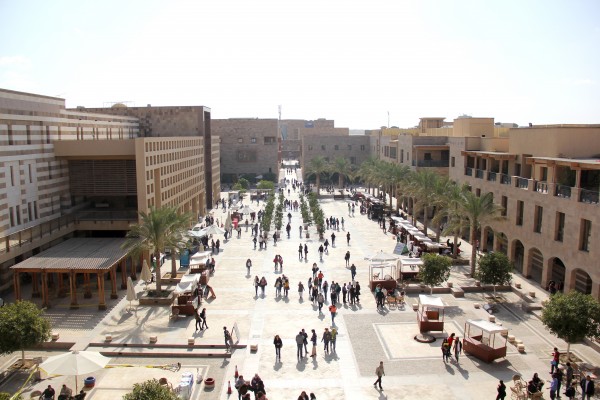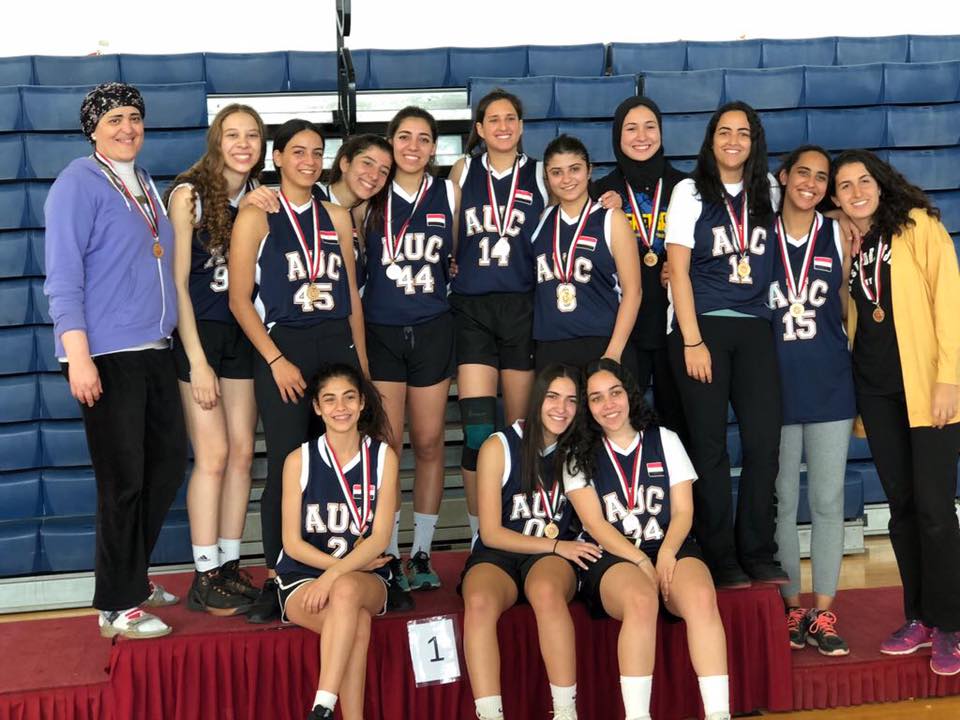SU: Accessibility is Key to a Successful Representative Union
By: Janna Adel
@janna_adel21
The President and the Vice-President of the Student Union (SU) are constantly innovating and planning on making the body more accessible to all students.
SU President Sherif El Naghi, a Construction Engineering senior, and VP Nour Barakat, a Political Science senior, say their focus is on preserving and developing the Union while fostering a sense of unity between everyone.
Reporter Janna Adel met with the duo to find how they’ve coped with the time in office and what comes next. Below are excerpts from that interview.
The Caravan: If you could summarize the Fall 2021 semester in just five words, what would they be? What are the major milestones of the fall 2021 semester?
El Naghi: Starting to define the SU.
The major achievements of the SU are the PVA Market, reopening the SU lounge, the Open Air Cinema, Fashion Festival, academic kits, and the SU packs.
What are the major challenges you faced this semester? And how did you deal with those challenges?
El Naghi: Planning events and on-ground activities while coping with COVID-19 restrictions and the University’s approval were and are our major challenges this semester. We tend to find some ways around those problems if possible and doable, with sending many proposals with different ideas and plans to implement the same event, respecting the university’s COVID-19 restrictions ahead, and integrating the small scale events like Marwan Moussa’(an Egyptian Rapper) seated concert and making the cinema idea an open-air cinema.
What skills and competencies should a president and vp have to perform effectively?
El Naghi: A president, or a vp, should be a leader, good listener, capable of working under pressure, and putting into consideration that each decision you take is not in the name of Sherif or the name of the SU only, but in the name of the whole student body, because you’re representing them in each and every decision.
Barakat: They should be visionaries and strategists, always planning ahead; they should be empowering, encouraging, motivating, and supporting each one on the team to pave their own way and do their thing.
What approach do you take when making big-picture decisions? And how do you select priorities while making important decisions?
Barakat: We look at the impact of that decision, as we consider two things: how time-sensitive it is and can we put it on hold or postpone it. The other factor is the stakeholders who are directly impacted by my decision. Can I mitigate this impact or can I reframe the idea to make it happen. We always try not to cancel anything out, as any idea our team comes up with is worth acting upon; therefore, most of the time, we try to work with or around the system rather than canceling it altogether.
Briefly describe an effective way to measure success.
El Naghi: Measuring success should occur at the end of the academic year, where the team can see the bigger picture, such as how many student-related problems we were able to solve. It is nearly impossible to have a full year at the SU solving all the problems, yet success would be having the major problems solved through the SU or the students. In addition to this, being successful is all about having the SU in each student’s daily life and being approachable 24/7, which is possible now through the SU Hotline.
Barakat: Success is dynamic, there is no specific equation to measure success, yet some variables would add to the picture, including how the president and the vp leave the SU, whether on a more powerful or weaker level. Another huge factor of success is how the SU is a learning experience, and since students who work in the Union, when facing obstacles, can make it through and learn from that experience.
As leaders, How do you stay updated about new developments?
Barakat: This is a network where there are 12 committees. Each one has around two to three chairpersons; we [El Naghi and Barakat] have weekly meetings with each committee’s chairpersons, and we are always involved in the work and projects. Each chairperson has their network with the general managers, as well and the network keeps going on.
El Naghi: Being a leader is about trusting and giving the space for the individuals working with you, as they went through a long process to be a part of the SU to have a responsibility to act upon any problem on hand, where we [El Naghi and Barakat] completely trust that any decision they would take would always be in favor the SU.
How do you keep the whole team motivated?
Barakat: A huge part of the motivation is self-motivation; each person has their own things that makes them motivated; for example, it can be their team, members, their co-worker, or the SU itself; it varies from one person to another. Even for day-to-day needs, whenever anyone needs advice, guidance, or just chatting, they are always accessible.
El Naghi: It is all about giving the space for the team to feel supported, as no matter what, we [El Naghi and Barakat] would always have their back. One of the things I learned from Nour was that the SU is a free space to make mistakes. Those mistakes will not negatively impact you. It is just a learning experience.
At the very end, the president and vp are students with assignments and deadlines. What keeps you motivated?
EL Naghi: The best part about being a president and vp that brings us joy and satisfaction is walking around campus solving problems for all the students. This position is a very beneficial challenge for me; even when I graduate, I plan to start a business that would offer beneficial services to people.
Barakat: Not everyone would voluntarily choose this position, but I did; whenever I get overwhelmed by problems or sometimes even disasters, what keeps me going is my faith in God that he chose me to be in this position and this time to solve that problem, in order not zone out and always focus on the bigger picture.
Describe how COVID-19 and the university restrictions are impacting your work and productivity.
Barakat: Since this is the second year after COVID-19, we believe they have gained experience of the pandemic and its uncertainties. The biggest challenge, in my opinion, would be that once we were back on campus, everything would have gone back to the way it used to be, which I consider unfair not only to ourselves but also to the political and social environment because we all changed. It would be unfair to act utterly blind in the face of change, whether to the university, as an institution, or to us, as individuals.
El Naghi: The SU is navigating what things from the old normal should be expected now and what other things that we, as a community, should get accustomed to not being there. There are a lot of rules or things that happen on the spot, which was not the case before, where the SU would be expected to act upon immediately.
When the university stated that all the students should wear masks, the SU started to offer masks at each gate on campus and the SU help desk so that students wouldn’t be late for the classes. For example, with three semesters at home and students who did not even get a chance to see the university, a gap of lack of experience was created. Therefore, we created the Union Academy, a small-scale SU that prepares the students to be leaders in the next semester.
What are your expectations for the next semester?
El Naghi: We are always planning to make the SU more accessible, and I believe that the University would give more space in terms of approvals, which would give us a chance to do more and go above and beyond. Since the beginning of the semester with each initiative, we collect feedback from the students, and we believe that those feedbacks would come in handy in the next semester to do better.




